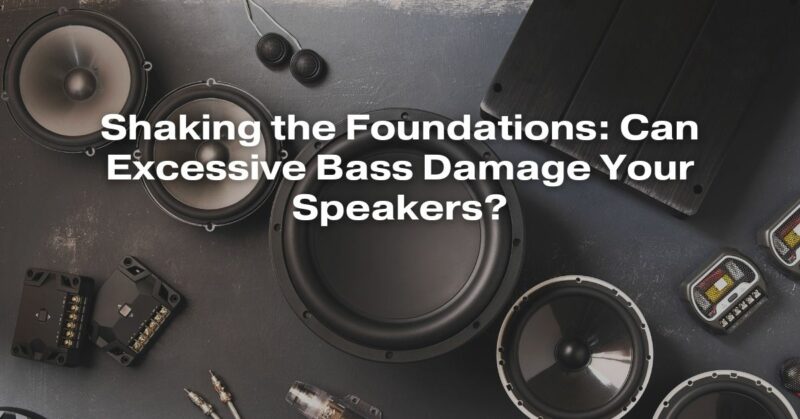When it comes to enjoying music or experiencing the heart-pounding action of a blockbuster movie, many of us crave the visceral impact of deep, rumbling bass. However, while a powerful bass can elevate our audio experience, it also raises an important question: can excessive bass damage your speakers? In this comprehensive article, we will explore the relationship between bass and speaker health, discussing the potential risks, preventive measures, and the role of technology in mitigating damage.
The Basics of Speakers and Bass
To understand the impact of excessive bass on speakers, we first need to grasp the fundamental workings of both components.
- Speakers: Speakers are intricate electromechanical devices designed to reproduce audio signals as sound waves. They consist of several critical parts, including a diaphragm (or cone), a voice coil, a magnet, and a suspension system. When an electrical signal (audio) is sent through the voice coil, it moves back and forth within the magnetic field generated by the magnet. This motion drives the diaphragm, which in turn generates sound waves that we hear as music or dialogue.
- Bass: Bass frequencies are characterized by low-pitched sounds that we feel more than we hear. They typically range from 20 Hz to 200 Hz, with sub-bass frequencies diving even lower, below 20 Hz. These frequencies are responsible for the deep, rumbling sensation that adds richness and depth to audio.
The Risk of Excessive Bass
Excessive bass can potentially harm your speakers in several ways:
- Overexcursion: When a speaker tries to reproduce bass frequencies beyond its designed capacity, it can lead to overexcursion. Overexcursion occurs when the diaphragm moves too far in and out, potentially causing physical damage to the speaker. This can manifest as tears or deformities in the diaphragm, voice coil rubbing against the magnet, or damage to the suspension components.
- Thermal Damage: High bass levels can also lead to thermal damage. As the voice coil moves rapidly to reproduce deep bass, it generates heat. If this heat isn’t dissipated efficiently, it can damage the voice coil’s insulation, leading to short circuits or even complete failure.
- Amplifier Overload: Excessive bass can push amplifiers to their limits, causing them to clip. Clipping occurs when an amplifier attempts to deliver more power than it can handle, resulting in a distorted signal. This distorted signal can harm both the amplifier and the speakers.
Preventive Measures
To protect your speakers from the potentially damaging effects of excessive bass, consider the following preventive measures:
- Use High-Quality Equipment: Invest in speakers and amplifiers that are designed to handle the power and bass demands you require. Quality equipment is less likely to suffer damage when subjected to heavy bass.
- Set Proper Gain Levels: Calibrate your audio system carefully. Ensure that your amplifier’s gain levels are correctly adjusted to prevent overloading and clipping.
- Utilize Bass Management: Many modern audio systems and receivers come with bass management settings. These settings can help redirect low frequencies to a subwoofer, relieving the main speakers of excessive bass duties and reducing the risk of damage.
- Limit Volume Levels: Avoid cranking up the volume to the maximum, especially when listening to bass-heavy music or watching action-packed movies. High volumes can push your speakers beyond their limits.
- Monitor Your Audio: Pay attention to how your audio system behaves. If you notice any distortion or unusual noises, it might be a sign that you’re pushing your speakers too hard.
Technological Solutions
Advancements in technology have provided additional safeguards against excessive bass damage:
- Limiters and Protection Circuits: Many modern amplifiers and powered speakers come equipped with built-in limiters and protection circuits. These mechanisms automatically reduce power output or shut down the system temporarily when they detect potentially damaging conditions, such as excessive bass.
- Room Correction Software: Room correction software can help optimize your audio system’s performance by adjusting for room acoustics. This can reduce the need to crank up the bass to compensate for poor room acoustics.
Conclusion
While excessive bass can potentially damage your speakers, understanding the relationship between bass and speaker health is crucial for audio enthusiasts. By investing in quality equipment, properly calibrating your system, and utilizing modern technology, you can enjoy powerful bass without putting your speakers at risk. Remember that responsible usage and regular maintenance are key to ensuring the longevity and performance of your audio equipment. So, go ahead and let the bass rumble, but do so wisely to preserve the integrity of your speakers and the quality of your audio experience.


